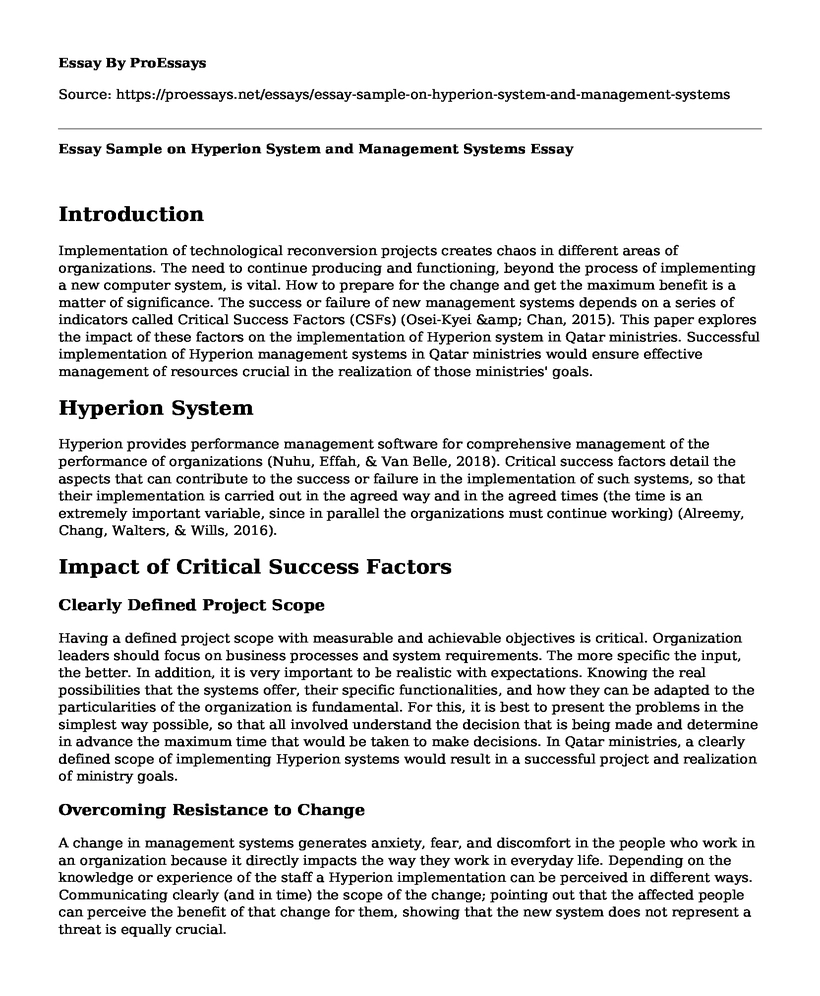Introduction
Implementation of technological reconversion projects creates chaos in different areas of organizations. The need to continue producing and functioning, beyond the process of implementing a new computer system, is vital. How to prepare for the change and get the maximum benefit is a matter of significance. The success or failure of new management systems depends on a series of indicators called Critical Success Factors (CSFs) (Osei-Kyei & Chan, 2015). This paper explores the impact of these factors on the implementation of Hyperion system in Qatar ministries. Successful implementation of Hyperion management systems in Qatar ministries would ensure effective management of resources crucial in the realization of those ministries' goals.
Hyperion System
Hyperion provides performance management software for comprehensive management of the performance of organizations (Nuhu, Effah, & Van Belle, 2018). Critical success factors detail the aspects that can contribute to the success or failure in the implementation of such systems, so that their implementation is carried out in the agreed way and in the agreed times (the time is an extremely important variable, since in parallel the organizations must continue working) (Alreemy, Chang, Walters, & Wills, 2016).
Impact of Critical Success Factors
Clearly Defined Project Scope
Having a defined project scope with measurable and achievable objectives is critical. Organization leaders should focus on business processes and system requirements. The more specific the input, the better. In addition, it is very important to be realistic with expectations. Knowing the real possibilities that the systems offer, their specific functionalities, and how they can be adapted to the particularities of the organization is fundamental. For this, it is best to present the problems in the simplest way possible, so that all involved understand the decision that is being made and determine in advance the maximum time that would be taken to make decisions. In Qatar ministries, a clearly defined scope of implementing Hyperion systems would result in a successful project and realization of ministry goals.
Overcoming Resistance to Change
A change in management systems generates anxiety, fear, and discomfort in the people who work in an organization because it directly impacts the way they work in everyday life. Depending on the knowledge or experience of the staff a Hyperion implementation can be perceived in different ways. Communicating clearly (and in time) the scope of the change; pointing out that the affected people can perceive the benefit of that change for them, showing that the new system does not represent a threat is equally crucial.
Achieving the Commitment and Support of the Management and Users
The success of project implementation is hindered when, when going down in the organization chart, specific issues arise for which there are no clear indications on how to move forward (Cunha, Gomes, & Morais, 2018). Or, on the contrary, progress is made in a direction that is not what is desired by the Directorate, which is informed of the decision taken late. That is why it is necessary for the highest levels of the company to be more deeply involved, and not only to point out the path they wish to travel at each crossroads but also to achieve agility in decision-making; motivate and engage the work team; point out the direction of the project and the company and fulfill its role of "agent of change".
Conclusion
Critical success factors are responsible for the success or failure in the implementation of a new management system. If implemented correctly, CSFs translate to the success of the project and consequent realization of the organization's goals. Therefore, all leaders in the various ministries must become aware of the importance of carrying out a good implementation and must be fully aligned in the process and motivate their sectors into successful implementation of such systems as Hyperion systems. This is enforced by developing a simple and effective contingency plan that allows visualization of the measures to be taken to guarantee efficient and effective service delivery by the ministries.
References
Alreemy, Z., Chang, V., Walters, R., & Wills, G. (2016). Critical success factors (CSFs) for information technology governance (ITG). International Journal of Information Management, 36(6), 907-916.
Cunha, C. R., Gomes, J. P., & Morais, E. P. (2018). Computational security models in organizations: bringing a pedagogical user-centered perspective. In 31st International Business Information Management Association Conference (IBIMA) (pp. 6163-6169). International Business Information Management Association (IBIMA). Retrieved from https://bibliotecadigital.ipb.pt/bitstream/10198/18042/3/31st%20IBIMA%20Proceedings_Security.pdf
Nuhu, H., Effah, J., & Van Belle, J. P. (2018). Implementing E-government Financial Systems in a Developing Country: An Institutional Perspective. Development Informatics Association (IDIA 2018), 45. Retrieved from https://www.idia2018.com/proceedings_pdf#page=57
Osei-Kyei, R., & Chan, A. P. (2015). Review of studies on the Critical Success Factors for Public-Private Partnership (PPP) projects from 1990 to 2013. International Journal of Project Management, 33(6), 1335-1346.
Cite this page
Essay Sample on Hyperion System and Management Systems. (2022, Nov 21). Retrieved from https://proessays.net/essays/essay-sample-on-hyperion-system-and-management-systems
If you are the original author of this essay and no longer wish to have it published on the ProEssays website, please click below to request its removal:
- Annotated Bibliography on Building Information Model
- Parameters of Ethical Decision Making - Paper Example
- Personal vs. Professional Ethics Essay Example
- How Did the Hackers Steal Target's Customer Data? Paper Example
- Jonathan Edwards' Spiritual Leadership - Essay Sample
- Leadership: Transform Vision to Reality With Prudence & Skills - Essay Sample
- Essay Example on MENA Region: Fostering Economic Growth & Enhancing Mutual Benefits







